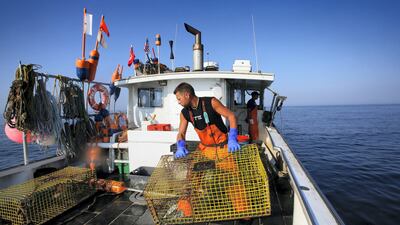Undeterred by biting winds as the temperature hovers around freezing, Maine’s lobstermen haul their traps out of their pickup trucks and onto their boats.
It is shortly after dawn in the coastal town of Ogunquit, the start of another working day that will last about 12 hours.
The tourists have gone and the “summer folk” have fled to the warmer climes of Florida. In Ogunquit’s Perkins Cove, a red icebreaker has been readied for the winter months, when it will make sure the lobstermen can reach lucrative fishing grounds in the Atlantic.
Lobsters are big business in Maine, and the north-eastern US state has long been famed for its connection to the tasty crustacean.
In 2020, the catch netted $400 million. Add to this supporting businesses such as processing and distribution and sales, and the industry is worth an estimated $2 billion a year to Maine’s economy.
But Maine’s biggest industry, which supports some 35,000 jobs, including 5,000 licensed lobstermen, has been thrust under a geopolitical spotlight amid trade tension with China.
Former president Donald Trump’s trade war led to Beijing imposing a 25 per cent retaliatory tariff on Maine’s lobsters — but not on those imported from Canada.
Sales plummeted 40 per cent in 2019.

“You had dealers telling lobstermen not to fish because we’re not buying your lobsters,” recalled Rick Dolliver, 52, who has been in the industry all his life.
The impact rippled across the local economy.
As lobstermen stayed home, the money usually spent on boats, fuel, bait and other gear dried up.
“It's just a trickledown effect that affects everybody in and around the fishing industry,” Mr Dolliver said.
Recently, however, Chinese demand has bounced back with a vengeance, increasing by nearly 50 per cent.
The key to the surge in demand was a 2020 deal in which China offered Maine’s lobstermen a one-year exemption from the punitive tariffs, effectively exempting $300m worth of US seafood from the levies.
The impact was spectacular. Lobstermen who had struggled to get rid of their catch are now commanding top prices, said Tim Tower, 70, a lobster-catcher whose family owns the Barnacle Billy’s restaurant in Perkins Cove.
“The price offered by the Chinese has been going up and up,” he said.
“It started at $14 a pound [$31 per kilogram], which was expensive. Then it went to $15 and $16 and then it jumped to $19.
“Soon it became a problem even finding lobster because everyone wanted to sell to the Chinese.”

Despite the tariff war, the Chinese appetite for lobster appeared undimmed. Once tariffs were lifted, Maine founding itself on a level playing field with the Canadians again.
Surging demand from China has come as a welcome reprieve from the effects of Covid-19.
The pandemic has caused visitors to stay away from Maine, depriving lobstermen of revenue in the summertime, when they take tourists on cruises, let them to pull traps from the seabed and buy the catch.
Mr Trump’s trade war with China was not the only time Maine found itself in the eye of a political storm. In October, online allegations surfaced in China that Covid-19 had originated in lobsters imported from Maine.
Marcel Schliebs, an Oxford disinformation researcher, traced the rumour back to a tweet made by a Chinese diplomat. Mr Schliebs discovered hundreds of fake accounts pushing the lobster theory in languages including English, Korean, Polish and Latin.
The researcher said, however, that he did not attribute the rumour to the Chinese government, and Beijing has denied involvement in any campaign to muddy the waters about Covid-19’s origins.
The suggestion that Maine’s lobsters were responsible for the disease that has claimed more than five million lives was greeted by a mixture of disbelief, annoyance and occasional amusement by locals.

“I didn't put much stock into it. I thought it was just an internet thing. I know many things get blown out of proportion on the internet,” Mr Dolliver said.
“Most of it I don't believe is true.”
Robert Long, a spokesman for the local Centres for Disease Control, dismissed the allegations as “a load of codswallop.”
Undeterred by the brouhaha, Maine’s lobstermen are still fishing, with some, like Grant Hubbard, refusing to take the alleged links seriously.
“It’s quite ludicrous. I had to take a few minutes to stop laughing,” Mr Hubbard said.
A spokesman for the Chinese embassy in London said: “China is the biggest victim of disinformation and the perpetrators are some politicians and media outlets eager for China-bashing in the US and a few other western countries.”


